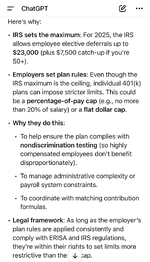Ucsdryder
Modern Fuddster
- Joined
- Jan 24, 2015
- Messages
- 7,495
AI can’t help me and HR was about as useful, so I came to ask a bunch of gun toting rednecks instead…
401k max contributions for employees are 23500 this year. My employer maxes me out at a percentage that won’t allow me to hit my max, yes they match, but different conversation.
My questions are…. Why would they put a max % and is there a way around it with pre tax dollars, if I’m going to use post tax I’ll just invest that myself?
401k max contributions for employees are 23500 this year. My employer maxes me out at a percentage that won’t allow me to hit my max, yes they match, but different conversation.
My questions are…. Why would they put a max % and is there a way around it with pre tax dollars, if I’m going to use post tax I’ll just invest that myself?

